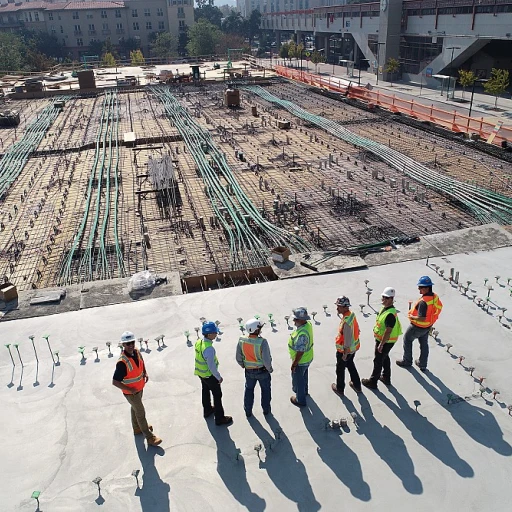
Understanding the Company Culture
Exploring the Workplace Environment
The culture of a company is a critical factor to consider during a job interview. It influences how employees interact, how the organization makes decisions, and how you will fit into the team. Asking informed questions about the company's workplace culture is a strategic way to assess if it aligns with your values and expectations. Some candidates might overlook this crucial aspect, focusing more on roles and responsibilities. However, understanding the company culture can provide a clearer picture of your potential work environment and long-term satisfaction.- How does your team describe the work environment here?
- This question will help reveal whether the work pace, communication style, or team dynamics match with your way of working. Good fits aren't just about the role, but about being comfortable with the cultural norms.
- How does the company ensure a good work-life balance for its employees?
- The answer to this question can give insights into the company's priorities and how it values employee wellness. Balancing work commitments with personal life is crucial for long-term happiness.
- Can you share some examples of how the company adapts to employee feedback regarding the workplace environment?
- A responsive company will have processes in place to respect and integrate employee feedback. This indicates a culture that values improvement and employee satisfaction.
Clarifying Role Expectations
Defining Job Responsibilities and Expectations
When entering a job interview, one of the key aspects to explore is understanding the role's responsibilities and what will be expected from you in this position. A well-defined role is crucial not only for personal job satisfaction but also for ensuring alignment with the overall team and company goals. It's important to ask specific questions to gain clarity about the day-to-day tasks you will be handling and the skills required for success. For instance, you might ask about the team's current projects and how your role fits into the work environment and workplace culture. This will help you assess whether the job aligns with your career aspirations and strengths. Consider posing questions like:- What does a typical day look like in this role?
- Can you share examples of key projects or tasks that will be part of my responsibilities?
- How will my performance be measured?
Career Development Opportunities
Exploring Professional Growth
When considering a job offer, many candidates are eager to understand the potential career development opportunities within the company. It's important to ask questions that will shine a light on this aspect during the interview process. These inquiries can offer insights into whether the role aligns with your long-term goals and if the company is invested in the growth of its employees. One important question to ask is how the company supports the professional development of its team members. By posing this question, candidates can assess if there are structured programs, training sessions, or educational reimbursements in place that will help to hone your skills over time. Additionally, engage the hiring manager in a discussion about potential career trajectories within the company. Seeking specific examples or asking for a sample answer, like how current employees have advanced, can provide clarity on the company's commitment to promoting from within. Don't forget to inquire about mentorship opportunities and whether there are systems in place to connect employees with experienced colleagues who can offer guidance and share their knowledge. This is particularly important for honing soft skills and gaining nuanced insights into the workplace culture. Finally, exploring how success is measured and rewarded in the role can help you understand what competencies are valued by the company. This will aid you in assessing if the company's expectations align with your personal goals and if you'll be a good fit for the organization's culture. For additional insights on optimizing your career progression within a company, consider discovering how unlocking the potential of efficenter by Adams Keegan can streamline HR processes and support your professional development journey.Compensation and Benefits
Understanding the Compensation Package
When stepping into a new role, understanding the compensation package is crucial. It’s more than just the salary; it encompasses a variety of benefits that can significantly impact your overall satisfaction with the job. During the interview, make sure to ask questions that will help you get a clear picture of what the company offers beyond the base pay.
Consider asking about the following:
- Bonuses and Incentives: Inquire about any performance-based bonuses or incentives. This can give you insight into how the company rewards hard work and dedication.
- Health and Wellness Benefits: Ask about health insurance, dental, and vision plans. Understanding what’s covered and the costs involved will help you assess if the company’s offerings meet your needs.
- Retirement Plans: Find out if the company offers retirement savings plans, such as a 401(k), and whether they match contributions. This is an essential aspect of long-term financial planning.
- Paid Time Off: Clarify the company’s policy on vacation days, sick leave, and other forms of paid time off. This will help you gauge how the company values work-life balance.
- Other Perks: Don’t forget to ask about additional perks such as gym memberships, tuition reimbursement, or flexible work arrangements.
These questions will not only help you understand the tangible benefits of the position but also provide insight into the company culture and how they value their employees. Remember, a good fit is about more than just the job description; it’s about finding a workplace culture that aligns with your personal and professional goals.
Feedback and Evaluation Process
Feedback Mechanisms to Foster Employee Growth
During your job interview, it's essential to ask questions about the feedback and evaluation process within the company. Understanding how feedback is delivered, and how often, can significantly impact your professional development in the role. Consider asking about the timeline and approach for performance reviews.
- Questions to consider: "How is feedback typically given to employees?" and "What does the evaluation process look like?"
- Insight into company culture: A structured feedback process can indicate a strong commitment to employee development and improvement.
- Candidate's perspective: Knowing whether you'll receive regular and constructive feedback will help you assess if the company is a good fit for your career growth expectations.
The answers to these questions will not only help you understand if the company's work environment promotes learning and growth but also reveal the importance it places on continuous improvement. This can make a significant difference in how supported and motivated you feel in your position.













